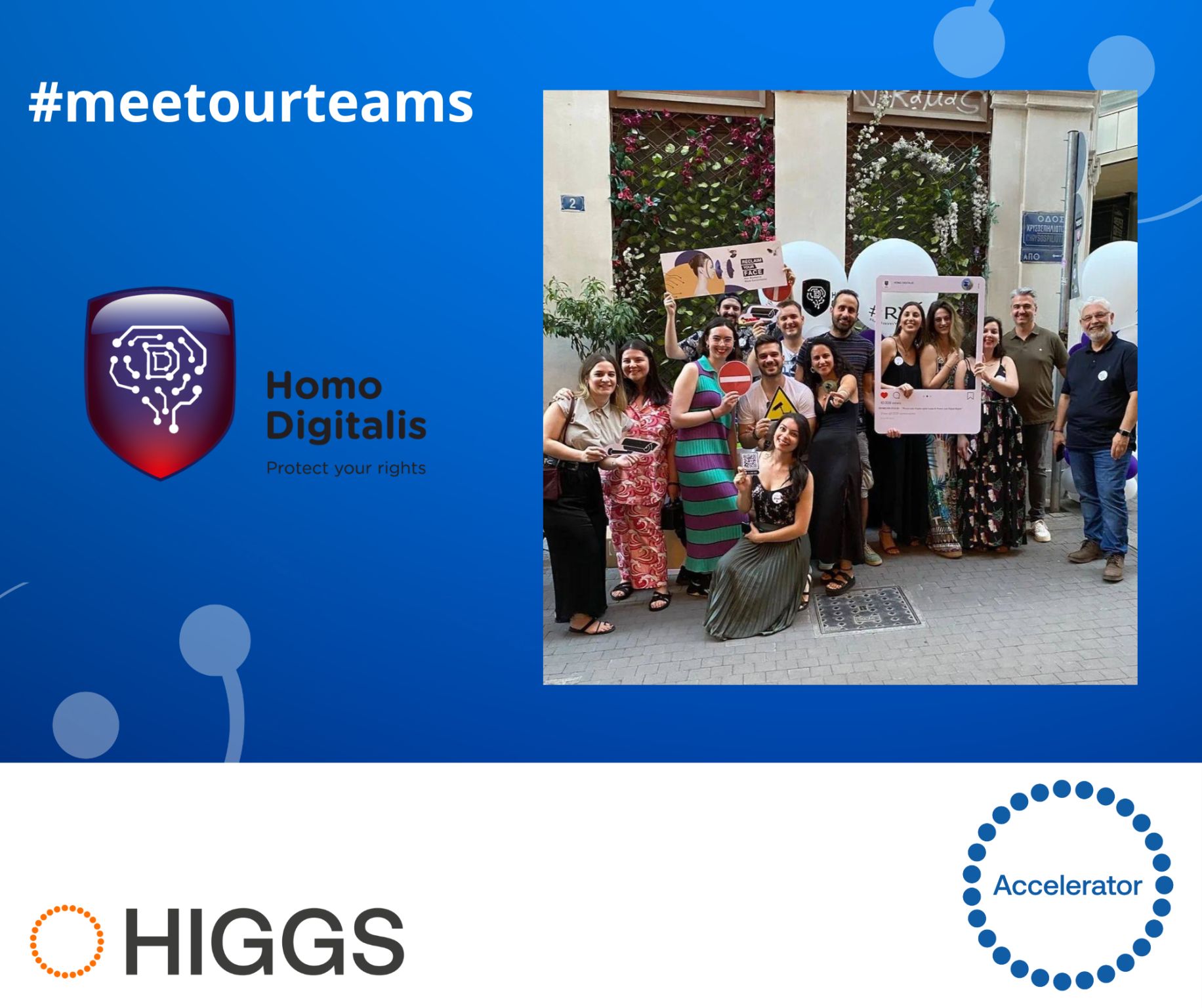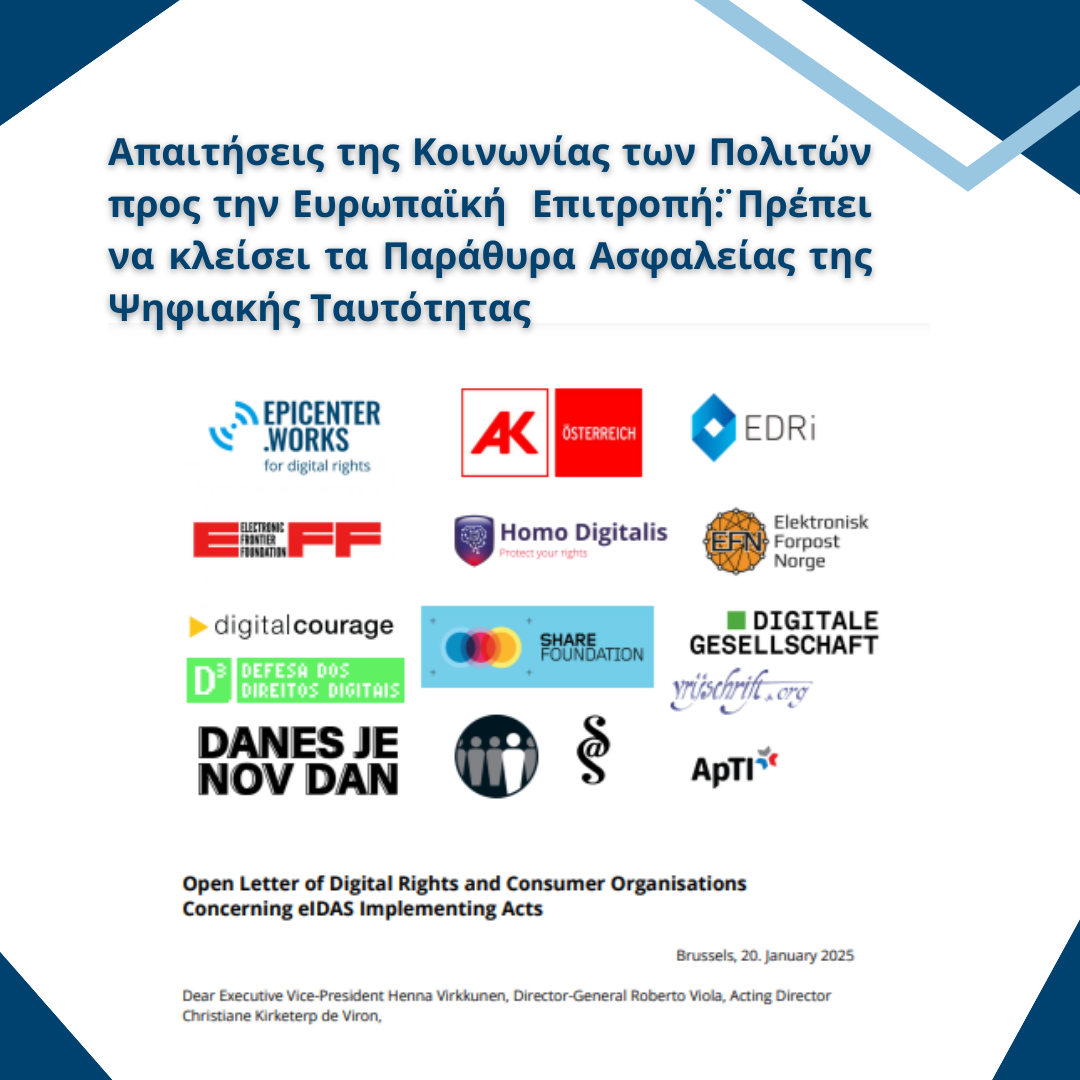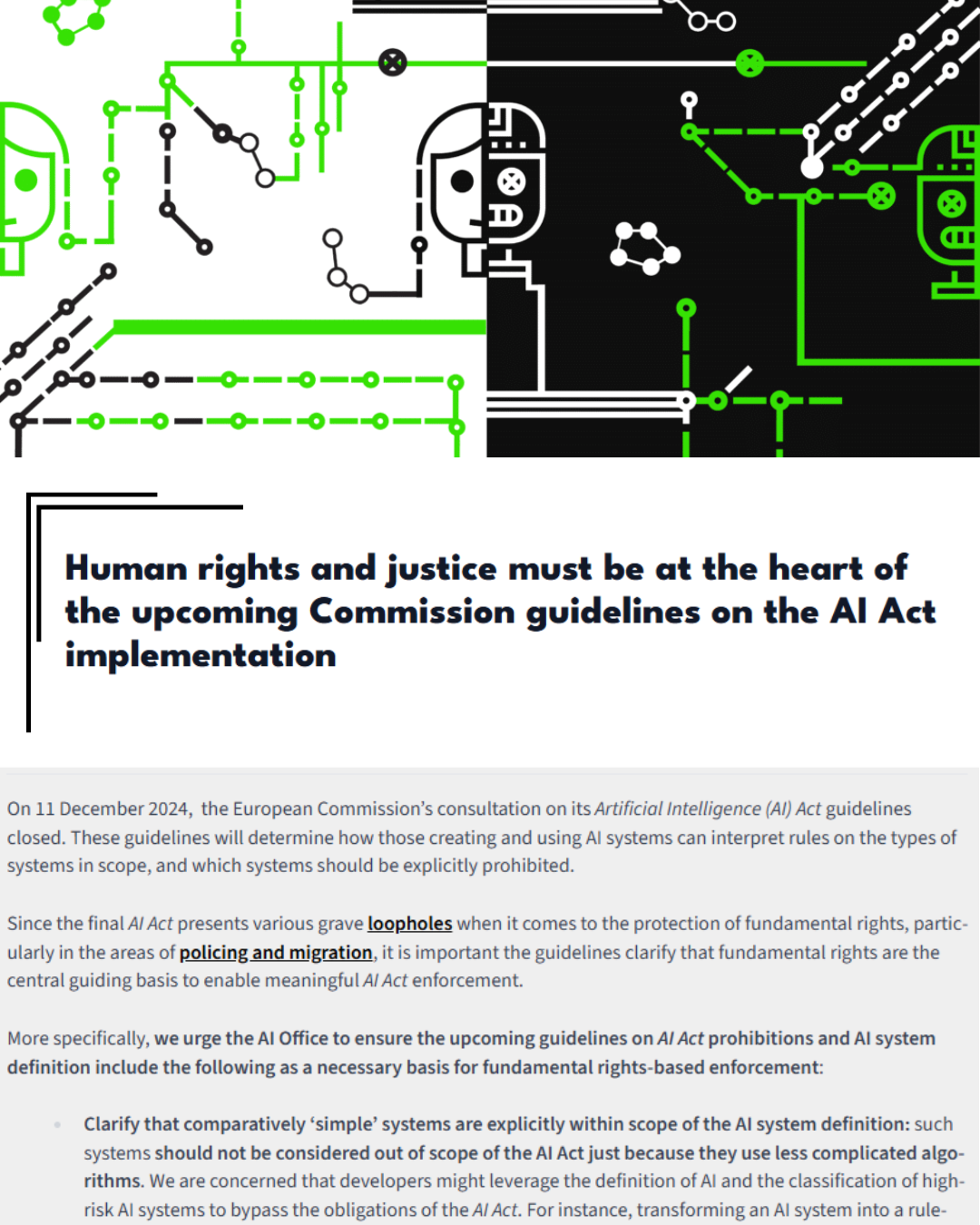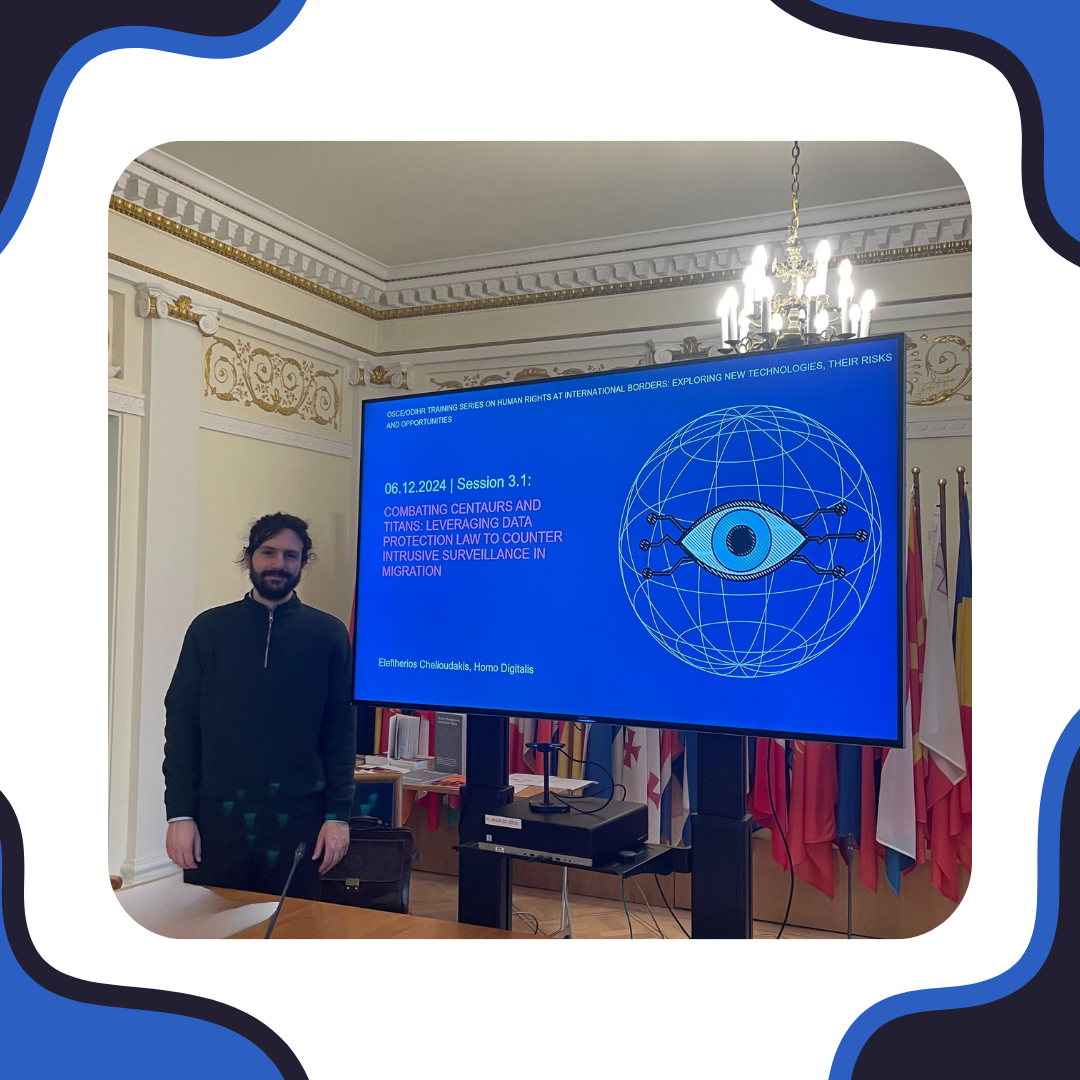New Volunteer Awareness Actions - 11th Unified High School of Larissa
Last week, we participated in yet another volunteer-driven awareness action, this time at the 11th Unified High School of Larissa!
There, our member and cybersecurity expert, Tasos Arabatzis, spoke to over 80 students and teachers from all high school grades about the rights we have in the digital space, as part of our educational presentation “Digital Footprint.”
We would like to sincerely thank the school’s principal, Mrs. Evangelia Kremetzi, for the kind invitation and excellent cooperation. We also thank Tasos’ company, Bora – Cybersecurity Marketing, which always gives him the flexibility to represent us in schools and other organizations voluntarily during working hours.
If you are interested in learning more about our pro bono awareness actions in schools, exclusively funded by our own resources, or if you are interested in organizing related actions at your school for the new school year, feel free to send us your messages at info@homodigitalis.gr
New Volunteer Awareness Actions - 59th High School of Athens
Last Thursday, January 23rd, we were at the 59th High School of Athens! There, we spoke for 4 teaching hours to over 200 students and teachers from the 1st and 2nd grade of high school about our digital footprint and cyberbullying! Our Director for Human Rights & Artificial Intelligence issues, Lambrini Gyftokosta, and our co-founder Eleftherios Chelioudakis represented us. The content of our presentations also includes material related to online identity theft, developed by the European research project EITHOS, in which Homo Digitalis participates voluntarily in the Ethics Advisory Board.
We would like to sincerely thank Counselor Mrs. Christina Kalfoglou, the Principal Mr. Katsikas, and the Teacher Mr. Sotiris Manousakis for the invitation and excellent cooperation! A big thank you also to the students for their active participation and trust.
If you are interested in learning more about our pro bono awareness actions in schools, exclusively funded by our own resources, or if you are interested in organizing related actions at your school for the new school year, feel free to send us your messages at info@homodigitalis.gr
Homo Digitalis spoke at the World Economic Forum in Davos, Geneva.
Doing More With Less at Geneva Day in Davos: How to address growing needs in times of economic uncertainty?
We explored this crucial question on Monday 21/1 during a panel discussion held as part of Geneva Day at the House of Switzerland in Davos. We were proud to participate in this event co-organised by Swiss Financial Innovation Desk and the Permanent Mission of Switzerland to the United Nations in Geneva, during the World Economic Forum 2025.
This engaging discussion explored emerging technologies such as Artificial Intelligence (AI), Blockchain, and Central Bank Digital Currencies (CBDCs), combined with innovative fiscal policies, as tools to meet the critical challenges of tomorrow. Our president, Elpida Vamvaka, represented our team speaking about our important actions and victories in the field of AI in Greece, as well as the NGI – The Next Generation Internet NGI TALER project, building a new, privacy-preserving, secure electronic payment system based on open standards, free software, and advanced cryptography.
A heartfelt thank you to the organisers and the distinguished panelists Christoph König, Deputy State Secretary, State Secretariat for International Finance SIF, Kelly T. Clements,, Deputy High Commissioner at UNHCR, the UN Refugee Agency, Daniel Eidan, Advisor & Solution Architect at Bank for International Settlements – BIS Innovation Hub.
The amazing Eva Selamlar-Leuthold, Head of Swiss Financial Innovation Desk (FIND), moderated this particularly dynamic and insightful discussion in a unique manner.
We would also like to extend our warmest thanks to Jonas Pasquier, Head of Global Affairs at the Permanent Mission of Switzerland to the UN in Geneva, his entire team, the Mission, as well as the Presence Switzerland team at the House of Switzerland, for making this event a success.
Would you like to get more insights from this discussion. Stay tuned for an upcoming publication by the Swiss Financial Innovation Desk, here.
New Volunteer Awareness Actions - 7th Technical High School of Larissa
Last Wednesday, January 15th, Homo Digitalis member and cybersecurity expert Anastasios Arabatzis spoke to 100 students of the 7th Technical High School of Larissa about our actions. We would like to sincerely thank the teachers for their kind invitation and the students for their attention. More awareness actions are coming up in Larissa in the coming days! Stay tuned!
We continue our participation in the Accelerator program of HIGGS
We continue our participation in the Accelerator program of HIGGS. The team of Homo Digitalis has been participating in the Accelerator program of HIGGS since October 2024, and now the second cycle of intensive seminars is starting with the aim of training us to improve our organizational structures as well as the management of our operations.
Specifically, the Accelerator program helps us learn, improve, and shape a better strategy for our future. The opportunity to participate in this program gives us access to high-level information that will help us improve the management and actions of Homo Digitalis, as well as the chance to develop a unique network of contacts with other organizations in the public sector and experts in the field!
Civil Society Demands: EU Commission Must Close e-ID Loopholes!
The final technical design of the European Digital Identity Wallet is currently under negotiation. These blueprints will have a big impact on whether or not users will be sufficiently protected when using Europe’s upcoming digital identity system. In concrete terms, this is currently being negotiated in the eIDAS implementation acts between the EU member states and the European Commission.
The positive changes in the first batch of technical rules show: Civil society works! Together with 15 organisations we thank the negotiators and acknowledge these significant improvements for privacy and human rights safeguards. The most recent proposals, however, still have some severe privacy and transparency problems that we address in our open letter to the European Commission.
What is the problem?
The eIDAS regulation lays out concrete rules for those companies and government agencies who want to access personal information from citizens’ Wallets. This could be for example an online platform, a public transport company or your doctor. It obliges these so-called “relying parties” to register their intended use of the Wallet, that is which attributes they intend to request from users. The regulation also prohibits them from asking information that goes beyond their registration. This could mean for example that, according to its registration, an online shop is only allowed to ask for your name and address but not your birth date or other information. A porn platform might use the Wallet to verify your age, but couldn’t obtain not any other information about you or use other means to track your behaviour.
To protect everyone from such illegal requests, the EU’s Digital Identity Wallet needs to know what personal information a relying party is actually allowed to access. The EU Commission, however, proposes a loophole which would leave it to the Member State that registered the relying party to decide whether the Wallet knows about the contents of the registration or not. This would allow Facebook Ireland to circumvent the protections and ask European users for everything. Furthermore, the public register of relying parties risks being useless without harmonised specifications on how to access it and what results to expect. Ultimately, the trust we will put in the Wallet will depend on the protections and transparency that we can rely on.
15 Organisations demand: The Commission’s Loopholes Must be Closed!
If these loopholes remain, this would have disastrous consequences. Any discrimination based on illegal access to attributes in the Wallet (health, gender, income, etc.) would be unchecked. Given the track record of lax data protection enforcement in countries like Ireland, companies like Facebook Ireland would likely have a wildcard certificate, virtually empowering them to request any data they want. Member States dedicated to protecting their users from illegal requests (e.g. Germany, the Netherlands, Spain or Austria), on the other hand, would be incapable of doing so.
We therefore ask the Commission to make relying party registration certificates mandatory for all relying parties and to issue a harmonized specification to access the relying party registry of each Member State.
The President of Homo Digitalis, Elpida Vamvaka, is Invited to WEF at DAVOS: Recognition on a Global Stage
We are thrilled to announce that Homo Digitalis has been invited to participate in an esteemed panel discussion at DAVOS, organized by the Swiss Financial Innovation Desk (FIND) of the State Secretariat for International Finance and the Permanent Mission of Switzerland to the UN in Geneva in the context of the World Economic Forum (WEF).
Event Details:
Topic: Doing More with Less: How to Address Growing Needs in Times of Economic Uncertainty
Date & Time: Tuesday, January 21, 2025 | 17:00-18:30
Location: Crystal Lounge, Davos
Our President, Elpida Vamvaka, will join a distinguished panel of global leaders to discuss how emerging technologies such as Artificial Intelligence (AI), Blockchain, and Central Bank Digital Currencies (CBDCs) can empower governments and organizations to address critical global challenges in times of economic uncertainty. Specifically, in the panel hosting our President, Elpida Vamvaka will be also speaking:
– Christoph König, Deputy State Secretary, State Secretariat for International Finance
– Kelly Clements, United Nations Deputy High Commissioner for Refugees
– Morten Bech, Centre Head Switzerland, Bank for International Settlements (BIS) Innovation Hub
The moderator of the panel will be Eva Selamlar, Head of Swiss Financial Innovation Desk (FIND)
While we celebrate this global recognition, it underscores the need for similar trust and acknowledgment at the national level in Greece. Strengthening Greece’s commitment to technological innovation and policy foresight will pave the way for meaningful change.
You can find more details about the event here.
Let’s make human rights-oriented innovation the cornerstone of a brighter and more resilient future – for Greece and the world.
Joint Statement on the Upcoming European Commission Guidelines on Prohibited Practices of the AI Act
We are publishing a joint statement on the upcoming European Commission Guidelines on Prohibited Practices of the AI Act.
On December 11, 2024, the European Commission completed its public consultation on the interpretation of the definition of an AI system and on prohibited AI practices, in accordance with the provisions of Regulation 2024/1689 (AI Act). Homo Digitalis participated in the related process.
In the context of the issuance of the expected guidelines by the Commission, concerns remain about potential gaps that could jeopardize fundamental rights. For this reason, and together with more than 25 civil society organizations, academics, and other experts, we are issuing a statement today, urging the AI Office and the European Commission to ensure specific demands.
You can read our joint statement here.
Eleftherios Chelioudakis of Homo Digitalis as a Trainer in the 3rd OSCE ODIHR Training on Personal Data & Border Management
From December 4 to 6, Eleftherios Chelioudakis, our Co-founder and Executive Director, participated as a trainer in the third training session organized by the international organization OSCE, specifically its Office for Democratic Institutions and Human Rights (ODIHR) in Warsaw. The training explored the use of new technologies at international borders, as well as the risks and opportunities they pose for Human Rights.
In our five presentations, we focused on the technologies used at borders, the Human Rights impacted by these uses, the provisions of the GDPR and Directive 2016/680 LED, the significant decision by the Hellenic Data Protection Authority (HDPA) regarding the “KENTAYROS” and “YPERION” systems, as well as technical tools that human rights defenders can use in their work!
We extend our heartfelt thanks to the participants for their dynamic presence, to the team of outstanding trainers Nikola Kovačević, Djordje Alempijevic, and Arancha Garcia del Soto for their knowledge and expertise, and to the organizing team, Lola Girard and Veronica Grazzi, for their impeccable organization and contributions. It is a great honor for us to participate!
You can learn more here.








